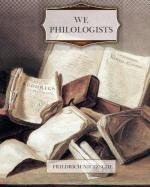I think I have recognised in my examination of the question that all our philology—that is, all its present existence and power—is based on the same foundation as that on which our view of antiquity as the most important of all means of training is based. Philology as a means of instruction is the clear expression of a predominating conception regarding the value of antiquity, and the best methods of education. Two propositions are contained in this statement. In the first place all higher education must be a historical one, and secondly, Greek and Roman history differs from all others in that it is classical. Thus the scholar who knows this history becomes a teacher. We are not here going into the question as to whether higher education ought to be historical or not; but we may examine the second and ask: in how far is it classic?
On this point there are many widespread prejudices. In the first place there is the prejudice expressed in the synonymous concept, “The study of the humanities”: antiquity is classic because it is the school of the humane.
Secondly: “Antiquity is classic because it is enlightened——”
28
It is the task of all education to change certain conscious actions and habits into more or less unconscious ones; and the history of mankind is in this sense its education. The philologist now practises unconsciously a number of such occupations and habits. It is my object to ascertain how his power, that is, his instinctive methods of work, is the result of activities which were formerly conscious, but which he has gradually come to feel as such no longer: but that consciousness consisted of prejudices. The present power of philologists is based upon these prejudices, for example the value attached to the ratio as in the cases of Bentley and Hermann. Prejudices are, as Lichtenberg says, the art impulses of men.
29
It is difficult to justify the preference for antiquity since it has arisen from prejudices:
1. From ignorance of all non-classical antiquity.
2. From a false idealisation of humanitarianism, whilst Hindoos and Chinese are at all events more humane.
3. From the pretensions of school-teachers.
4. From the traditional admiration which emanated from antiquity itself.
5. From opposition to the Christian church; or as a support for this church.
6. From the impression created by the century-long work of the philologists, and the nature of this work. It must be a gold mine, thinks the spectator.
7. The acquirement of knowledge attained as the result of the study. The preparatory school of science.
In short, partly from ignorance, wrong impressions, and misleading conclusions; and also from the interest which philologists have in raising their science to a high level in the estimation of laymen.
Also the preference for antiquity on the part of the artists, who involuntarily assume proportion and moderation to be the property of all antiquity. Purity of form. Authors likewise.




